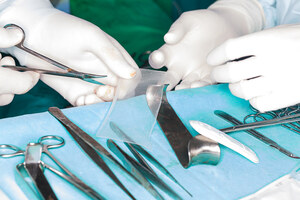 And with worsening injuries their cases have become more complex. Since filing his complaint, plaintiff Robert Stinson underwent more revision surgeries involving a different Bard hernia mesh product, which resulted in loss of a testicle due to complications. He had the Bard mesh implanted in 2017 and had additional surgery in May 2023. The court order dated June 20 states that:
And with worsening injuries their cases have become more complex. Since filing his complaint, plaintiff Robert Stinson underwent more revision surgeries involving a different Bard hernia mesh product, which resulted in loss of a testicle due to complications. He had the Bard mesh implanted in 2017 and had additional surgery in May 2023. The court order dated June 20 states that:"When this case was selected Mr. Stinson had the second most commonly alleged device at issue (the PerFix Plug) and his alleged injury (pain) was the most commonly alleged injury in the MDL … What makes a bellwether trial representative . . . is litigation- and fact-specific. . . . With the parties’ participation and cooperation, the court engaged in a lengthy bellwether plaintiff selection process."
Plaintiff Jacob Bryan was selected by Bard in December 2021, two years after his deposition. At the time he complained of groin/testicular pain. Now, he too may require additional surgeries, which could result in the removal of a testicle. Bard claims it will likely take several months to determine Bryan’s actual injuries, and that could prove difficult to meet the current January 2024 trial date.
Bard said that when Bryan was first selected as a bellwether case “the only current complaint was pain,” which was an alleged injury “common to more than 81% of claimants in the MDL.” Further, Bard stated that “Mr. Bryan did not seek treatment for groin pain in over five years, and the ongoing medical developments “make his case a moving target.” According to the court order, “Defendants selected Bryan in December of 2021, over two years after his deposition. Defendants were therefore aware of his complaints of groin/testicular pain and cannot now claim it is a new injury…Additionally, any claims that he may have new injuries or an orchiectomy that set his case apart from others in the MDL are speculative because he has not had any such surgery at this time.” Sargus denied Bard’s requests for both Stinson and Bryan.
The case is 2:18-md-02846-EAS-KAJ Doc #: 763
The first two Bard hernia mesh trials under Sargus ended in mixed results. The first case that went before a jury in August 2021 resulted in a win for Bard. The second was a victory for plaintiffs with a $225,000 jury verdict. Bard is facing over 18,000 similar lawsuits filed throughout the federal courts system over complications associated with polypropylene mesh systems, including including Bard Ventralight, Bard Ventralex, Bard 3DMax, Bard PerFix Plug, and others.
FDA’s Hernia Mesh Pros and Cons
On July 13 the FDA published a guide on hernia surgery mesh complications, which outlines the pros and cons for patients considering a surgical mesh implant to treat a hernia. “The Hernia Surgical Mesh Risks and Benefits” guide indicates that approximately 30% to 65% of hernias will eventually require surgical treatment.
READ MORE SURGICAL MESH LEGAL NEWS
Often, revision surgery was needed to remove the mesh. In some cases the mesh has adhered to vital organs and could not be removed. Benefits, if designed and implanted correctly, include a reduction of the risk of a recurring hernia, decreased operative time and a faster recovery time. Given the number of lawsuits, with more complaints being filed now, it would seem that the risks outweigh the benefits.
